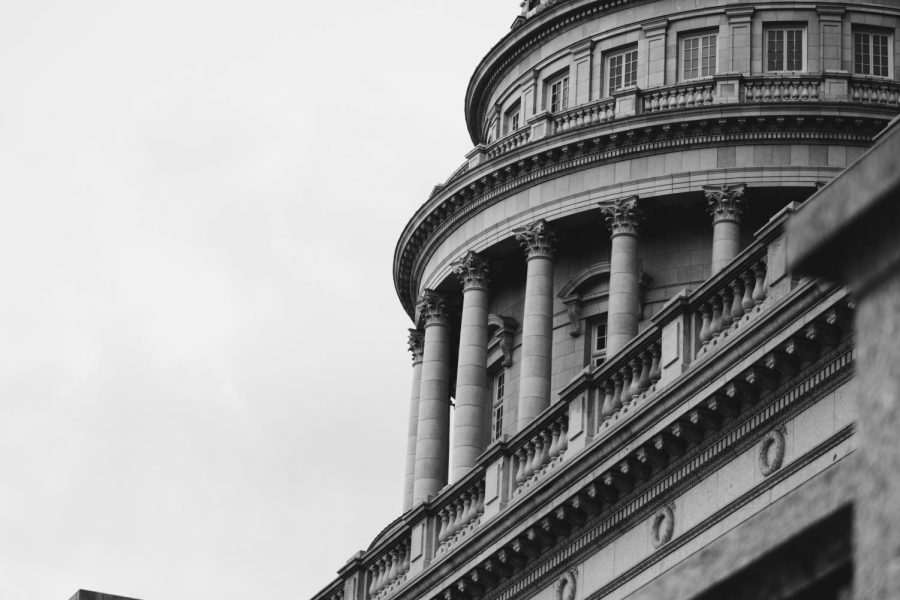Langley and Petters: Stop Taking Women’s Rights Away
The Utah State Capitol Rotunda on Friday, Feb. 12, 2020. (Photo by Mark Draper | Daily Utah Chronicle)
March 10, 2023
Since the overturning of Roe v. Wade in 2022, conservative legislators have saddled nearly half of the United States with limitations or outright bans on abortion. Utah’s Rep. Karianne Lisonbee introduced H.B. 467, which would prohibit any abortion clinic from acquiring a license to perform medical abortions. It also modifies the requirements needed for an individual to have an abortion. With approval from Gov. Spencer Cox already, the bill will likely pass into law.
Overall, the legislation is yet another careless attack on women’s rights by conservative politicians within Utah. As the battle for autonomy and rights continues for women, legislation like H.B. 467 regresses Utah’s political atmosphere and forces conservative ideologies onto everyone within the state.
What H.B. 467 Takes From Utahns
H.B. 467 would drastically affect women’s healthcare. All abortion clinics would be denied their licenses. Adding to H.B 297, which requires healthcare facilities to provide detailed information on a woman’s sexual assault to approve their abortion, further restrictions will be placed for abortion permittance. By 2024, Utahns will have no abortion access unless they fall under extremely specific circumstances. The legislation also imposes momentous penalties for those breaking this law, such as reporting physicians to the licensing board.
Rep. Lisonbee believes that if a woman doesn’t want to get pregnant, they should control their semen intake. She implies that victims of sexual abuse could control what happened to them — a stipulation so heinous and vile that she deserves no place in office. She also claims to be a homemaker yet supports denying low-income mothers the right to an abortion, which is a major cause of poverty among younger women. Apparently, her definition of a “homemaker” means taking away people’s ability to create stable homes. Her motives are obvious. She does not care about families, only her own ideologies.
Adverse Effects of Limiting Abortion
Limiting abortion is an extremely divisive topic within American politics. Researchers have found, however, that the maternal death rate will rise by 24% if states continue to ban abortion access. Black mothers would experience exponentially worse mortality due to racism within the healthcare industry. States with existing abortion restrictions have higher rates of maternal and infant mortality. For politicians that claim to protect life, their laws most certainly do not. This is an attack on women’s health. Abortion restrictions don’t halt the act, it only stops them from getting performed safely. Women would have to go through strenuous and dangerous processes to receive abortions.
Community Responses in Utah
Despite Utah consistently ranking as one of the most conservative and religious states, a majority of Utahns approve of the legality of abortion in some capacity. Consequently, thousands of Utahns have publicly expressed discontent with our legislature’s attack on reproductive rights since Roe v. Wade. Alongside active citizens, many organizations in Utah make it their mission to educate our community about reproductive rights and health.
While reproduction rights advocates in Salt Lake City have enjoyed much media coverage, many protests in less populated regions can go overlooked. Latrisha Fall, an organizer with Pro Roe Vernal Facebook group in the Uintah Basin, helped shed light on the experiences of rural protesters. Her group, through marches in local parades and informational events, aims to “[get] the correct information out there” and “provide reproductive education, including birth control and sex education.” When Fall first learned about H.B. 467, she said, “My first reaction to [the bill was], it is targeting people of lower socioeconomic status.”
Fall stressed the financial harm and burden to out-of-state hospitals that women forced to travel for an abortion can bring. On top of the price of an abortion, traveling out of state can add up to thousands to the cost of the procedure. When asked about the particular struggles that rural Utahns can have when trying to fight bills like these, Fall said, “It is hard when you live in rural communities because everybody knows who you are. And so that can seem very risky to put yourself out there.” Despite this risk for some, Fall fully encourages people to do what they can, even if that does not include an open demonstration.
Members of the LGBTQIA+ community in Utah have also made their position on abortion clear. Ermiya Fanaeian, an organizer with the Salt Lake City Armed Queers and the Utah PSL, expressed her opinion about H.B. 467: “It goes to show that the state, and certainly so many of our lawmakers, such as Lisonbee, really don’t care how this will impact women and all marginalized people.”
Having organized numerous demonstrations for reproductive rights, Fanaeian also expressed the importance of recognizing the relationship between queer and reproductive rights.
“This bill will be yet another barrier for queer and trans people to have the means to access health care,” Fanaeian said. She added that she felt “[conservative legislators] couldn’t care less whether or not marginalized people will be impacted by this in ways that are fatal.”
Organizations such as Planned Parenthood and ACLU have fought alongside protesters since the overturning of Roe v. Wade. For instance, the two organizations filed a lawsuit against the state of Utah immediately after Utah’s abortion trigger ban. In doing so, Planned Parenthood and ACLU were able to deter the state from passing the law without further discussion. The two have also publicly announced their opposition to H.B. 297 and 467. The commitment that advocates show in this state contrasts the dysfunctional decision-making skills of some of our legislators.
When the disconnect between the values of our representatives and citizens is more apparent than their ability to serve us, we must stay strong. Reproductive rights are essential to the long-term health and stability of all citizens. More importantly, they are inherent human rights. Utah should not only do away with H.B. 297 and 467 but halt any notion of limiting abortion.









